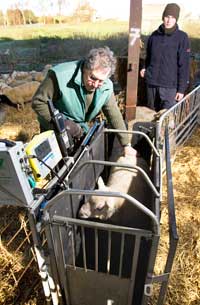Push EID rules to breaking point, Scottish farmers told

The rules of electronic identification of sheep (EID) regulation should be “used, abused and pushed to breaking point” to make them workable for Scottish farmers, according to industry leaders.
But farmers should not be tempted to risk export bans or the loss of single by downright ignoring the legislation.
Speaking to 130 northern sheep producers at the first of nine EID roadshows, NFU Scotland and the National Sheep Association said they would continue to search for concessions to the complex and expensive legislation, due to come in next year.
The organisations are using the roadshows to seek a mandate from members on how to proceed politically.
“Downright non-compliance with EID would lead to a partial or total loss of Single Farm Payment and present France with the golden opportunity to impose a ban on imports of Scottish lambs,” said NFUS vice-president Nigel Miller.
“And any future disease outbreaks with no EID in place would make any resumption of exports to Europe virtually impossible.
“This regulation kicks in next year, but it’s not retrospective and it has a long fuse,” he added. “If we push the rules to the limit you won’t have to double tag anything in 2010, so whatever you do, don’t give up and sell your sheep yet.”
Unlike DEFRA, the Scottish Government is continuing to call for further concessions and is due to launch a Consultation on Friday (28 August) on the implementation of the regulation and its implications for the industry.
There is also a strong possibility that the Scottish Government will deliver a live database to help the system operate.
Mr Miller added: “Compared to us, the English are in a real nightmare situation because DEFRA has stated outright that it will not deliver a database to record individual IDs. Therefore the benefits, if there are any, would be wiped out as farmers will be forced to scan on farm and no useful data will be gathered.”
George Milne, NSA’s Scottish development officer, said efforts were continuing to lobby other European countries to support a push for further concessions.
He visited Sweden, which currently holds the UE Presidency, and got a sympathetic hearing from the country’s agriculture minister, but was told to canvass more support among other countries.
“We need to get enough countries which represent over half the sheep in Europe on board, and then the Swedes will listen,” Mr Milne added. “We are not giving up. To walk away from the fight now would be unforgivable.”
